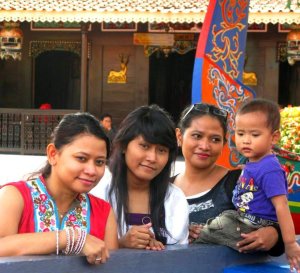Who is Mona and what is her involvement with state-subsidized health care in Indonesia?
A small mattress stained in a rainbow of colors lay in an empty hospital bed at Fatmawati, a large, full-accredited treatment and training hospital in South Jakarta.
Two hysterical children — including my nephew 18 month old Ahmad Fahri — arrive from the operating room carried by their mothers.
Yesterday after arriving at the hospital, 18-month old Ahmad Fahri played happily on the floor with other young patients.
But you could see his surprise when met Maulana , a child about his own age with hydrocephalus, a condition relating to the flow of cerebrospinal fluid. Malulana’s head appears to be at least four times the size of Fahri’s.
Fahri was born with Hirschprung’s disease. Two of Fahri’s first words were “hurts” and “scared” will come in handy here at the state hospital. However, he seems to understand that the doctors want to help him and usually tells them terima kasih or thank you.
Mona laid Fahri in the bed and tried to calm him. Then she arranged his IV drip and ran off to the pharmacy with a prescription, first giving a few instructions to Fahri’s father and her 15-year old daughter, Halima.
Now Fahri must begin his recovery from the first of a series of operations – a colostomy — which it is believed will eventually give him full, normal use of his colon.
It isn’t immediately clear who is charge of Fahri’s post-operative care. Perhaps it is his mother, Mona, who like many Indonesians uses only one name.
Up and down four flights of stairs, she is back again. She worries about where the drugs will come from. Will someone bring them? Would her husband be able to pick them up without being able to read? No medical staff are in sight.
Mona, age 30, is the oldest of four children in a family that immigrated to Jakarta from the island of Madura, between Java and Bali. She didn’t finish school but — unlike her mother — she can read and speaks Indonesian without an accent.
Mona’s generation is the first within her family that takes city life for granted. But she also speaks fluent Maduran and enjoys visits to verdant, peaceful countryside of Madura. With competencies and comfort levels beyond those of either her younger siblings or parents, she has grown up with a lot of weight on her shoulders.
Only one of the six beds in this room without air conditioning in the children’s ward is empty. That means five Indonesian families who qualify for government health insurance share a single room.
The room is full of family members trying to ascertain and attend to the needs of the recently admitted children. Young siblings and cousins of the patients manage to release stress by relaxing beneath the hospital beds or exercising in the hallways. After lunch, several young men and women come in to smile at Fahri and the other young patients. They wear smart hospital clothing but apparently lack medical training.
Finally a nurse takes Fahri to a small room across the hall. He repositions the plastic pouch attached to his belly which will supplant all his bowel functions for the next few months .
Why are they hurting me again, the little patient may well have asked. He was restrained by his mother, father and an aunt, while other family members watched the sad but successful intervention through a window. Then Fahri’s sister, who had permission to miss a day of junior high, left for a laboratory in a far corner of the medical campus with a tissue sample.
The pouch replaced and antibiotics administered, Mona fanned her exhausted baby with a folded sheet of newsprint. She smiled broadly. While this was just the beginning of a series of operations, it marked the end of a long process of inquires, applications and tests.
“Finally we’re beginning,” she said.

Jane 4:36 pm on April 28, 2012 Permalink |
Incredibly descriptive. It painted a picture for me of what the inside of a hospital there looks like. I can’t imagine what Mona has to taken on. How can she smile after her child went through that ordeal? She’s strong. Why can’t her husband read? He is also from Madura?